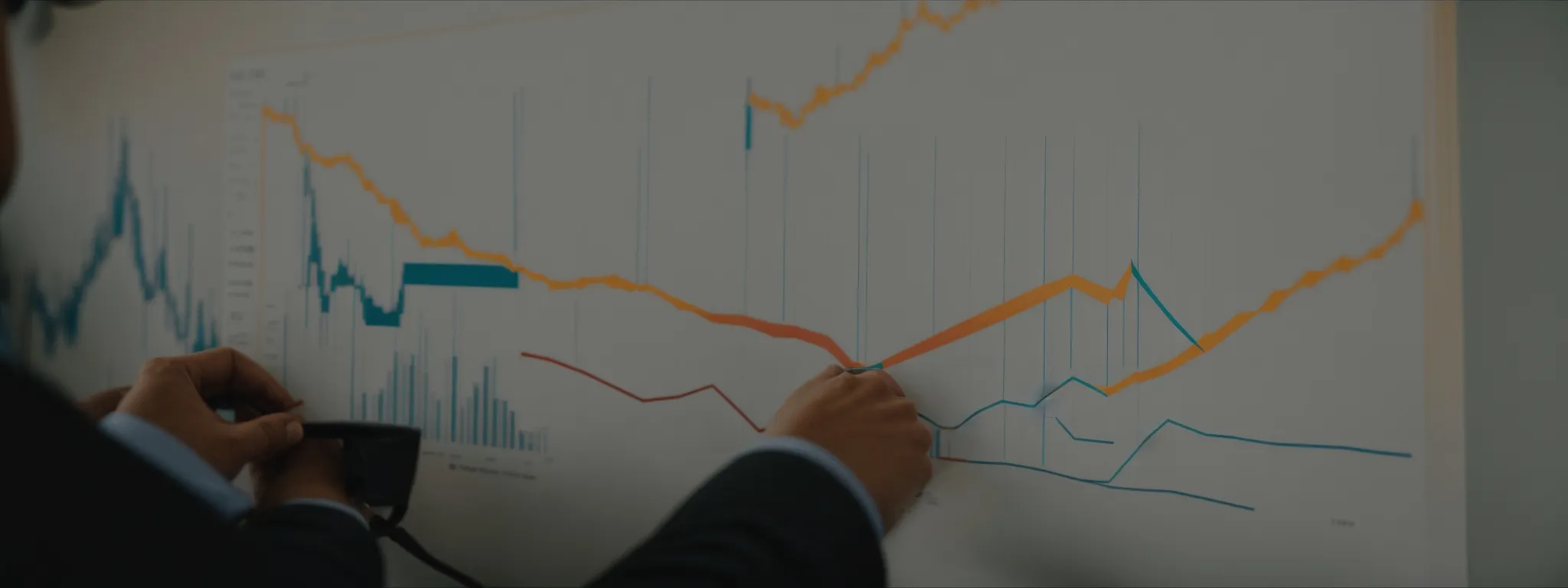Should You Buy Backlinks SEO Consideration Risks
Evaluating the Risks: Is Purchasing Backlinks for SEO Worth It? The allure of climbing the ranks in search engine results often tempts website owners towards the contentious […]
Evaluating the Risks: Is Purchasing Backlinks for SEO Worth It?
The allure of climbing the ranks in search engine results often tempts website owners towards the contentious tactic of purchasing backlinks.
It’s an area fraught with controversy, as the buying and selling of links clashes with the ethos of organic search engine optimization and runs afoul of webmaster guidelines.
Despite the potential for quick gains, the repercussions of such actions can irreversibly tarnish a brand’s reputation and search rankings.
Weighing the risks against the potential rewards is vital for any SEO strategy that considers buying backlinks.
Keep reading to arm yourself with knowledge to decide whether this approach aligns with your digital marketing objectives.
Key Takeaways
- Purchasing Backlinks Poses Significant Risks, Including Penalties and Damage to SEO Credibility
- Backlinks Must Come From Credible Sources and Be Contextually Relevant to Enhance Website Authority
- Google’s Webmaster Guidelines Dictate the Acceptable Parameters of Link Acquisition and Frown Upon Purchased Backlinks
- A Diversified Link Acquisition Strategy That Mimics Natural Growth Is Crucial to Avoid Search Engine Penalties
- LinkGraph Champions High-Quality Content and Legitimate SEO Practices Over the Risks of Backlink Purchasing
Understanding the Potential Pitfalls of Link Buying

In the complex realm of search engine optimization, buying backlinks often surfaces as a tantalizing shortcut toward elevated search rankings.
However, the allure of immediate results belies the inherent risks associated with this controversial tactic.
Professionals and industry experts unequivocally emphasize the potential repercussions, which include severe penalties from search engines and adverse impacts on SEO standing.
The challenge lies not only in evading punitive measures but also in guaranteeing that the procured links are of high quality and contextually relevant—a failure to do so can lead to a significant drain on marketing resources without sustained improvement in rank.
This introduction paves the way for an in-depth examination of the hazards linked to backlink purchasing and underlines the crucial need for vigilance and strategic foresight in any approach to SEO.
The Risk of Penalties and Negative SEO Impacts
In the precarious landscape of SEO, the act of purchasing backlinks carries a high risk of inviting search engine sanctions. Companies may find their websites penalized, resulting in a sharp decline in organic visibility and a substantial setback to their search engine ranking.
Furthermore, the negative impacts of buying links can extend beyond immediate penalties. Poor quality or irrelevant backlinks have the potential to undermine the integrity of an SEO campaign, gradually deteriorating a site’s credibility and user experience.
- Penalties may manifest as a drop in organic search visibility.
- Search engine sanctions can regress search engine ranking progress.
- Incurring a penalty entails a complex recovery process.
- Bought backlinks that are low-quality damage SEO credibility.
- Irrelevant links harm the user experience, tarnishing brand reputation.
The Challenge of Ensuring Link Quality and Relevance
Navigating the minefield of backlink quality presents an arduous task for SEO practitioners. Genuine backlinks must originate from credible sources and align with the content they accompany, ensuring the enhancement of a website’s authority in the eyes of search engines.
Link relevance is non-negotiable in the quest for SEO success: relevance signals to search engines that a website’s content is valuable to users, bolstering its potential for higher rankings. Consequently, discerning the context and credibility of each backlink emerges as a major hurdle that demands meticulous attention.
| Consideration | Impact on SEO |
|---|---|
| Backlink Source Credibility | Strengthens website authority and trustworthiness |
| Link Contextual Relevance | Enhances content value and search engine rankings |
| Quality of Linked Content | Affects user engagement and referral traffic potential |
The Potential for Wasted Investment Due to Transient Ranks
Companies investing in backlinks as a means to accelerate SEO often face the harsh reality of temporary rank improvements. Despite the initial uplift, search engines may recalibrate their algorithms, rendering these paid links ineffective and turning the investment into a fleeting advantage rather than a sustainable gain.
The ephemeral nature of purchased links can lead to substantial financial losses, especially when marketers rely on this method without embedding it into a broader, more robust SEO strategy. Businesses must evaluate the longevity of their ranking efforts and avoid allocation of funds that may yield only short-term visibility in search results.
Considering Backlink Quality Over Quantity

In the intricate dance of search engine optimization, there lies a nuanced balance between the quantity and quality of backlinks, a balance that can define the success or failure of an SEO strategy.
Astute professionals know that evaluating the authority and trustworthiness of link sources is paramount to establishing a reputable online presence.
Counteracting the allure of quick-fix, low-quality link schemes demands discernment, as the consequences of such decisions often result in more harm than benefit.
Emphasizing content alignment with backlink profiles not only ensures coherence and relevance but firmly roots a brand within the fertile soil of organic search credibility.
This strategic approach to backlink acquisition necessitates a comprehensive understanding of these facets to elevate a brand’s search engine standing effectively.
Assessing the Authority and Trustworthiness of Link Sources
Assessing the veracity and authority of a link source stands at the core of any Sound Backlink Strategy. SEO professionals must conduct thorough examinations of potential link sources, ensuring alignment with Google’s Webmaster Guidelines to maintain and enhance the website’s SEO health.
Trustworthy backlinks are signifiers of a website’s standing within its industry, acting as endorsements from the wider web community. Companies must aim to secure Editorial Links from esteemed sites that elevate both authority and trust in the eyes of discerning search algorithms.
| Quality Indicator | Authority Impact | Trustworthiness Impact |
|---|---|---|
| Domain Reputation | Directly correlates with perceived site credibility | Reflects reliability and industry standing |
| Editorial Context | Enhances niche authority through topically relevant linking | Signals integrity and content alignment with provider’s standards |
| Link Profile Diversity | Indicates natural and organically-built web presence | Suggests genuine recognition over manipulative link patterns |
Avoiding the Lure of Fast, Low-Quality Link Schemes
As companies strive for prominence in the Search Engine Landscape, the temptation to quickly amass a volume of backlinks through expedited schemes can be attractive. Nonetheless, experienced SEO professionals caution that such practices, enticing as they are for their speed, often comprise low-quality links that can damage a brand’s long-term SEO efforts and credibility with search engines.
In this competitive digital era, the value of organic, well-earned backlinks should not be underestimated, and therefore, smart businesses resist the quick-fix allure of these schemes. Instead, they focus on crafting high-quality content that naturally attracts valuable backlinks, which in turn, strengthens their SEO Foundation and fosters sustainable growth in search engine rankings over time.
The Importance of Content Alignment With Backlink Profiles
Ensuring a seamless Correlation Between Content and Backlink Profiles is a cornerstone in establishing a website’s domain authority. Backlinks that direct to content which resonates with the source’s niche and audience validate the authenticity of the connection, signaling to search engines that the linking is not only intentional but meaningful and resourceful.
The synergy created when backlinks are strategically synced with high-quality, relevant content can significantly amplify a website’s influence and standing in search engine results. This harmony goes beyond mere numbers, transcending into the realm of qualitative SEO where the caliber of connections reigns supreme.
Weighing the Cost-Benefit Ratio of Purchasing Links

In a marketplace increasingly driven by online visibility, the strategic allocation of marketing spend towards search engine optimization can make the difference between a brand that thrives and one that merely survives.
Scrutinizing the cost-benefit ratio of buying backlinks emerges as a critical endeavor for businesses seeking to discern the genuine value of such a practice within their broader SEO portfolio.
As organizations confront the reality of fluctuating search algorithms and the elusive nature of SEO gains from purchased links, a comprehensive assessment is mandatory.
This requires balancing the allure of short-term rank boosts against the sustainable return on investment from long-term strategies and integrating these tactics within the constraints of a marketing budget focused on fostering organic growth.
The journey towards a robust digital presence continues with an exploration of realistic expectations, careful calculation of long-term returns, and a prudent balance among various growth initiatives.
Realistic Expectations of SEO Gains From Bought Links
Establishing a realistic viewpoint on the merits of backlink purchasing is imperative for any company weighing its SEO strategy. Contrary to the elevated expectations of skyrocketing in search rankings, the results from bought links are often much less clear-cut and are swayed by numerous factors, including the quality and relevance of the links.
Market leaders are aware that although purchased backlinks might offer a transient uptick in search visibility, their value is circumstantial, frequently short-lived, and can falter in comparison to organic SEO methods. A judicious approach often involves a critical analysis of how these acquired links align with overarching SEO goals and long-term brand growth.
Calculating Long-Term ROI Against Short-Term Boosts
As stakeholders venture into the SEO marketplace, they are faced with decisions that may significantly influence their digital trajectory. The allure of purchasing backlinks presents itself as a seemingly lucrative strategy for swift search engine recognition; yet, professionals must project the ramifications onto the landscape of long-term ROI, scrutinizing whether these transitory rank elevations constitute a prudent investment relative to enduring organic growth techniques.
When brands consider the integration of paid backlinks into their SEO blueprint, it becomes essential to quantify the return on investment beyond the surface-level surge in search engine placement. The interpretive analytics must pivot from immoderate expense for ephemeral gains to a steadfast commitment to strategies that cultivate Lasting Search Authority and consequential market presence, thereby nurturing a sustainable ROI.
Balancing Marketing Budgets With Organic Growth Strategies
LinkGraph’s Approach to SEO emphasizes the judicious allocation of marketing resources to cultivate robust organic growth. Recognizing that sustainable SEO success is not solely predicated on the volume of backlinks, the company prioritizes strategies that boost long-term value over short-lived ranking spikes, ensuring clients’ investments foster enduring website authority.
Expertly navigating the intricate balance between budget constraints and effective organic strategies, LinkGraph designs initiatives that enhance search performance without an overreliance on paid links. Their adept SEO professionals focus on creating high-quality content and user experiences that naturally attract backlinks, thus delivering a more Substantial Return on Investment for their clients.

Exploring the delicate interplay between search engine optimization and adherence to stringent webmaster protocols presents an intricate challenge for businesses aiming to enhance their online authority through backlinks.
With Google’s stern policies dictating the acceptable parameters of link acquisition, entities must tread carefully, fully recognizing the severity of potential repercussions stemming from disapproved link schemes.
It becomes increasingly critical to discern the practices that intelligently navigate these guidelines while maintaining a stance within white-hat SEO tactics.
This section probes into the realms of Google’s stance on link schemes, the tangible risks tied to noncompliance, and the strategies that deftly align with Ethical Link-Building Methodologies.
Understanding Google’s Policies on Link Schemes
In the meticulous landscape of SEO, grasping Google’s stringent policies on link schemes is vital for maintaining a website’s search integrity. Google’s Webmaster Guidelines explicitly discourage the purchase of backlinks, as this practice can skew search engine results and degrade user experience.
The search engine giant seeks to ensure that backlinks are earned rather than bought, favoring natural link growth as an indicator of a website’s content quality and relevance. This policy stems from Google’s commitment to delivering accurate search results and thwarting attempts to manipulate rankings through artificial means.
- Google’s Webmaster Guidelines serve as a critical reference for ethical link-building practices.
- Purchased backlinks are disfavored by Google as they can distort genuine site authority.
- Earning backlinks naturally aligns with Google’s objective to refine search result authenticity.
The Risk of Getting Caught and the Consequences Involved
When companies contravene search engine policies by purchasing backlinks, they face the tangible risk of severe punitive actions. The intricacies of algorithmic monitoring mean that such infractions rarely go unnoticed, leading to penalties that can range from rankings demotion to complete removal from search results.
The aftermath of being sanctioned for engaging in paid link schemes can cascade into a long-term erosion of online visibility and credibility. Businesses must acknowledge the grim reality that the fallout from search engine penalties could overshadow any perceived short-term advantages, potentially inducing far-reaching financial and reputational damage.
Identifying Which Paid Link Practices Can Pass as White-Hat
Within the strict confines of search engine rules, identifying white-hat practices in the context of paid links is crucial to safeguarding a brand’s SEO integrity. Admissible white-hat practices may include paying for the time and effort involved in writing High-Quality Guest Posts, wherein payment is for content creation rather than the link itself.
The case of Sponsoring Content or Events where a link is provided as an acknowledgment rather than a commodity straddles the line of acceptability: it remains crucial here that the quality of the content or the relevance of the event holds more weight than the mere existence of the backlink.
| Practice | White-Hat Compliance | SEO Relevance |
|---|---|---|
| Content-Based Guest Posting | Payment for creation, not links | Content quality takes precedence |
| Sponsorship Acknowledgment | Link as a byproduct of support | Focus on content/event relevance |
| Nofollow Links in Advertisements | Adheres to nofollow attribute use | Separation from organic ranking factors |
Strategies to Mitigate Risks When Buying Backlinks

As businesses scrutinize the complexities of search engine optimization with a focus on maximizing their search rankings, the proposition of purchasing backlinks often comes under careful consideration.
To ensure that the balance remains tipped in favor of SEO enhancement rather than detriment, a multifaceted approach is required.
Proactive measures include a thorough vetting of link selling services, developing a diversified link acquisition strategy, and intentionally crafting a backlink profile that matures naturally over time.
This introduction lays the groundwork for navigating these strategic imperatives, each critical in minimizing risks while seeking to navigate the undulating terrain of SEO with prudent investment into backlinks.
Conducting Thorough Vetting of Link Selling Services
Conducting thorough examinations of link selling services is paramount to safeguarding the integrity of an SEO strategy. Companies must meticulously assess the reputation, track record, and compliance with search engine guidelines of these services to ensure they are not compromising their website’s standing in search rankings.
Engaging with link selling services necessitates a clear understanding of their methods and the quality of the backlinks they offer. Businesses should demand transparency and vet the backlink profiles meticulously to align their purchases with search engines’ emphasis on authenticity and relevance.
Developing a Diverse Link Acquisition Strategy
A carefully orchestrated link acquisition strategy should avoid overreliance on any single source or method: it thrives on variety. By integrating multiple avenues for obtaining backlinks—including organic outreach, content marketing, and strategic partnerships—organizations can create a robust backlink profile that sends strong authority signals while reducing the risks associated with link-buying practices.
Ensuring a blend of high-quality nofollow and dofollow links is a crucial component of a diverse strategy: this duality mirrors the natural link ecosystem and aligns with search engines’ expectations for authenticity. By endorsing a pluralistic approach, businesses can reinforce SEO efforts and foster a more resilient online presence:
| Link Type | Source | SEO Benefit |
|---|---|---|
| Nofollow | Content Syndication, Sponsored Posts | Enhances branding, mitigates risk of penalty |
| Dofollow | Organic Outreach, Quality Guest Blogging | Bolsters domain authority, improves ranking potential |
| Mixed | Strategic Partnerships, Authoritative Directories | Diversifies backlink profile, stabilizes SEO sustainability |
Building a Natural-Looking Backlink Profile Over Time
Establishing a backlink profile that evolves organically over time is essential to maintaining the illusion of natural growth, which search engines favor. Methodical pacing in acquiring backlinks, a focus on diverse sources, and a steady expansion of a brand’s online footprint can converge to mimic the typical development of a reputable site’s backlink structure.
To solidify a website’s reputation and avoid raising red flags with algorithmic patrols, business leaders are tasked with designing a backlink profile reminiscent of natural web progression. This entails careful planning and implementation to achieve a balanced mix of link types, sources, and velocities that reflect genuine brand evolution and audience building:
| Strategy Component | Function | Outcome |
|---|---|---|
| Link Type Variance | Aligns profile with natural web patterns | Cultivates authentic online growth perception |
| Source Diversification | Prevents over-reliance on one avenue | Disperses risk and strengthens authority signals |
| Calibrated Link Velocity | Simulates natural brand engagement escalation | Minimizes probability of algorithmic penalties |
Alternatives to Risky Backlink Purchases

Within the multifaceted ecosystem of SEO, purchasing backlinks often casts a long shadow of risk over the unassuming landscape of organic growth.
Progressive brands and savvy marketers now recognize the necessity to pivot away from potentially harmful practices, turning instead to robust alternatives that solidify their digital footprint.
The focus has shifted to nurturing the acquisition of backlinks through the merit of high-quality content, opening avenues for authentic guest posting partnerships, and capitalizing on the organic reach that social platforms and public relations maneuvers provide.
With these strategies front and center, the subsequent discourse explores the sustainable methodologies for link acquisition, unmarred by the pitfalls accompanying the outright purchase of links.
Emphasizing on Earning Links Through High-Quality Content
Emphasizing the creation and distribution of high-quality content remains LinkGraph’s cornerstone for attracting editorial links. This focus on excellence naturally garners attention and encourages authoritative sites to link organically, thereby increasing a client’s domain authority and reinforcing its relevance in search algorithms.
With an unwavering dedication to crafting Content That Resonates deeply with readers, LinkGraph facilitates the acquisition of backlinks driven by genuine interest and engagement. The strategy revolves around producing compelling, useful, and shareable content, which establishes trust and positions a brand as a thought leader within its industry.
Utilizing Guest Posting and Collaborations for Natural Links
LinkGraph’s approach to fostering legitimate link-building practices centers on Strategic Guest Posting and collaborations. By partnering with relevant industry platforms and influencers for guest content, clients are able to secure natural, high-quality backlinks that resonate with both search engines and target audiences.
These collaborative engagements go further than mere link insertion; they provide valuable content to readers while simultaneously weaving the client’s brand into the fabric of the digital landscape. It’s a process where quality, relevance, and professional community-building converge to support SEO goals authentically and effectively.
Leveraging Social Media and PR for Organic Link Acquisition
Leveraging social media and PR transcends traditional SEO to harness the power of audience engagement and brand visibility. Through strategic content dissemination and harnessing the amplification potential of social platforms, LinkGraph’s clients stimulate Organic Backlink Generation and capitalize on the dual benefit of direct audience interaction and SEO enrichment:
| Method | SEO Benefit | Brand Outcome |
|---|---|---|
| Social Media Engagement | Organic backlink potential | Direct audience communication |
| Public Relations Campaigns | Enhanced brand visibility | Strengthened industry positioning |
In concert with Public Relations Campaigns, LinkGraph’s strategy employs media outreach to underscore a brand’s narrative, ensuring its story is shared across diverse channels. This multifaceted approach not only builds a strong brand reputation but also encourages authoritative sites and news outlets to reference and link to client content, thus achieving organic link acquisition while fortifying the brand’s domain authority.
Conclusion
In conclusion, purchasing backlinks for SEO presents significant risks that often outweigh the short-term benefits.
Recognizing the consequences of penalties from search engines and the impact on SEO credibility is essential, as is understanding the importance of link quality and relevance.
Professionals must prioritize strategies that contribute to a natural-looking backlink profile over time, focusing on diversity and authenticity rather than mere quantity.
Establishing realistic expectations for the SEO gains from bought links and analyzing the long-term cost-benefit ratio is critical in decision-making.
Furthermore, aligning with search engine guidelines, conducting due diligence on link selling services, and developing alternatives for organic link acquisition – such as high-quality content, legitimate guest posting, and leveraging social media and PR – are key to sustaining a strong online presence.
Ultimately, investing in ethical, organic growth strategies offers a more stable and enduring return on investment, ensuring a robust digital footprint without the perils associated with purchasing backlinks.














































































